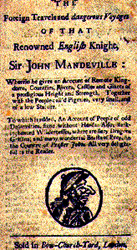|
|
|
 Some travel accounts have deeply influenced historical developments in their own or later times. Sir John Mandeville’s fictitious Travels and Marco Polo’s account of his own travels both inspired European peoples to venture beyond their own borders in search of wealth and commercial opportunities abroad. Christopher Columbus was quite familiar with both Mandeville’s and Polo’s works, as well as other travel accounts and geographical writings. Of course, later interpreters have made dramatically different uses of Mandeville and Polo, and indeed of Christopher Columbus himself, as they have sought to understand the past from fresh perspectives. While Columbus took Marco Polo as a guide to Asian lands and markets, for example, the Hungarian-British traveler and archaeologist Sir Aurel Stein read him closely to identify archaeological remains and find clues to the locations of abandoned sites along the central Asian silk roads. Some travel accounts have deeply influenced historical developments in their own or later times. Sir John Mandeville’s fictitious Travels and Marco Polo’s account of his own travels both inspired European peoples to venture beyond their own borders in search of wealth and commercial opportunities abroad. Christopher Columbus was quite familiar with both Mandeville’s and Polo’s works, as well as other travel accounts and geographical writings. Of course, later interpreters have made dramatically different uses of Mandeville and Polo, and indeed of Christopher Columbus himself, as they have sought to understand the past from fresh perspectives. While Columbus took Marco Polo as a guide to Asian lands and markets, for example, the Hungarian-British traveler and archaeologist Sir Aurel Stein read him closely to identify archaeological remains and find clues to the locations of abandoned sites along the central Asian silk roads.
Despite the popularity of the genre, some important
travel accounts had little immediate influence, sometimes because they
did not come to light until long after their composition, even though
they offer useful insights into the societies they discuss. Beyond the
circles of Muslim scholars in north Africa, for example, Ibn Battuta’s
travel account received little attention until the 19th century, but more
recently historians have found that it offers an unparalleled perspective
on the 14th-century Muslim world from West Africa to India and beyond.
 
|




 Some travel accounts have deeply influenced historical developments in their own or later times. Sir John Mandeville’s fictitious
Some travel accounts have deeply influenced historical developments in their own or later times. Sir John Mandeville’s fictitious